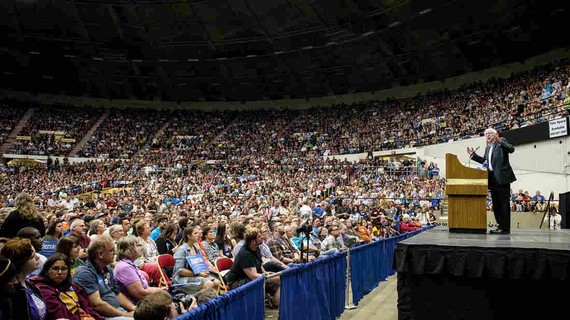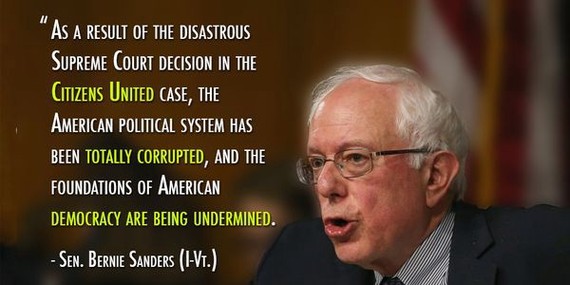The best way to disrupt the growing oligarchy is massive participation in our democracy
This is the first time in US history that a presidential candidate from a major party is running as a self-professed democratic socialist. That’s extraordinary and there’s been a lot of talk about what Sen. Bernie Sanders means by “democratic socialist.” However, the more extraordinary thing to me is that Sanders has injected into our political discourse a call for a political revolution.
Can you recall when any presidential candidate explicitly called for a revolution in the U.S.? I cannot. “We need a political revolution” would certainly not test well. Serious politicians would employ euphemisms like Obama did in 2008 with deft slogans such as “change we can believe in.” The fact that this has been Sanders’ dominant message since the beginning is a testament to the fact that his moral conviction is greater than his political ambition.
Sanders, in fact, was calling for a revolution before the 2014 midterms.
Our job is to make a political revolution. Our job is to educate and organize so that working people fight for their rights and for their dignity — and are actively participating in the political process…Please share your ideas with me. How do we make that political revolution? (Bernie Sanders, July 11, 2014)
Two years after the devastating midterms, Sanders answered his own question when he announced his candidacy in the 2016 presidential election.
Today, with your support and the support of millions of people throughout this country, we begin a political revolution to transform our country economically, politically, socially and environmentally. (Bernie Sanders’ announcement, May 26, 2015)
One reason that so many people didn’t take Sanders seriously is precisely because they believed his rhetoric is out of mainstream. Many people associate the word “revolution” with violence. They can’t imagine a peaceful one at the ballot. But this is precisely what Sanders has in mind.
I’ve had revolution on my mind since the Citizens United ruling by the Supreme Court in 2010 that allowed unlimited contributions by corporations to campaigns. Citizens United ruling is to the American Revolution in 2016 what the Stamp Act was to the American Revolution in 1775. Many of us were appalled by Citizens United, but we didn’t know how to revolt against the oligarchs who imposed it.
It would take six years — ten years passed between the Stamp Act and the American Revolution — for us to find a powerful response in and through Bernie Sanders. Arguably, the 2016 election is a referendum on Citizens United and whether or not we want a government of, by, for the people.
So, other than voting for Bernie Sanders, what else is meant by “revolution”? Getting clearer about what Sanders means by a revolution will help us answer the question, “How will he get anything accomplished as president”?
Critics of Sanders’ campaign say that his policy ideas such as single payer healthcare and tuition-free college education are pipe dreams. They argue that these programs would never pass Congress. This is probably true if nothing else changes in America during this election except who is placed in the White House.
Sanders’ main message is different from Clinton’s. He is not going around the country saying, “Vote for me, I’m the most qualified.” Everywhere he goes, he is asking people to “stand together,” “speak up,” “march together,” “work together,” etc. He is asking for us, the people, the electorate, to change how we engage in our democracy.
The mission for the Sanders’ campaign is entirely different from Clinton’s. It’s not about which candidate is better or which policies are better. It is about a revolution that is required to rescue American democracy. Even before the Princeton study confirmed it with scientific data, most of us knew that our democracy had morphed into an oligarchy.
He knows that the strategy of the oligarchy is the following: create and maintain low information voters, voter apathy, and low voter turnout. So, the best way to disrupt the growing oligarchy is massive participation in our democracy. And, of course this can happen. The idea of a new birth of democracy needs to go viral and fundamentally transform the electorate. From what we are seeing with the Sanders' campaign, this is happening.
1. Vote in every election.
Not just vote for Bernie Sanders in 2016, but vote at every opportunity including all primaries and local elections. In an op-ed in The Guardian, Sanders wrote that low voter turnout (36.6%) in 2014 was “an international disgrace.”
United States’ voter turnout is among the lowest among developed countries according to Pew. Voter turnout in the presidential election of 2012 was only 53.6%. Even in 2008, with the highest turnout rate since 1960, almost 80 million eligible voters didn’t show. Now imagine if those 80 million or even 40 million turned out to vote. Not just once, but in every election. That would be revolutionary.
So, who are these unlikely voters? According to a Suffolk University study, regardless of party affiliation, the majority of unlikely voters have convinced themselves that “voting wouldn’t make a difference” or politicians are “all the same.”
There’s evidence that the unlikely voters are waking up because Bernie Sanders is the first presidential candidate from a major party to forcefully confront the rich and the powerful.
Comments like this are found all over social media especially on Reddit and Facebook: “I’m 30 years old and have never voted even once in my life. Bernie Sanders will be the first person I actually think is worth my time.”
All the electoral strategies, predictions and polls are based on assumptions about who is likely to vote. Getting unlikely voters to vote will disrupt the status quo, the growing oligarchy.
2. Become informed.
For those of us who believe in a vibrant democracy with an engaged and well-informed electorate, we have a lot of work ahead. Sadly, in the year 2014, we must still convince the American people about the relevance of government to their lives. (Bernie Sanders, The Guardian, November 10, 2014)
Long before the primary, Sanders effectively used facebook and twitter to educate the public by creating viral memes and tweets. Sanders is out on the campaign trail teaching as much as he is campaigning for votes. And, this is working. He is convincing people that the misery of their lives is connected to bad policies.
It’s also true that the wake up call from the Occupy Wall St. movement and the popularity of Elizabeth Warren’s appearances in mainstream media intellectually prepared people to hear Sanders’ message. His ideas didn’t seem so strange and outside the mainstream because they are consistent with Occupy Wall St and Elizabeth Warren.
3. Take collective action.
We need to go beyond voting to organizing collective action — lobby, petition, march, protest, communicate with our representatives. Organize like our lives depend on it.
Especially given how high the stakes are in getting money out of politics, there needs to be massive participation to undo Citizens United and corruption. We know that the majority of Americans (84%) believe money has too much influence in our politics. He is asking us to commit to taking organized collective action as Americans to save our democracy.
4. Stay vigilant.
This last point gets to the heart of the question, “How will Sanders get things done in Washington if he becomes president?”
As president, Sanders will be in a powerful position to inform and engage the electorate. In the manner that Franklin D. Roosevelt governed, Sanders will forcefully call out corruption and fascism and rally people to take collective action. We may anticipate hearing speeches like this one.
The first truth is that the liberty of a democracy is not safe if the people tolerate the growth of private power to a point where it becomes stronger than their democratic state itself. That, in its essence, is Fascism — ownership of Government by an individual, by a group, or by any other controlling private power. (Franklin D. Roosevelt, “Message to Congress on Curbing Monopolies,” April 29, 1938)
We the People, in turn, must rise to the occasion and commit to being good citizens and take ownership of our government. This American Revolution must start from within.
Partnered with President Sanders, We the People will disrupt the oligarchy with sudden and unexpected participation. We will remain informed and vigilant as citizens. And, this is precisely what the founding fathers had in mind.
The founders believed that citizens must be vigilant. It is not enough to be well-informed; citizens must also safeguard their liberties. Though Hamilton and Thomas Jefferson seldom agreed on much, both would echo Jefferson’s assessment of the need for vigilance. “All tyranny needs to gain a foothold is for people of good conscience to remain silent,” Jefferson wrote. (William Chrystal)
In order for the revolution to succeed and our democracy to work, we, the electorate, must change. We must end the era of voter apathy and usher in a new birth of freedom and democracy.


